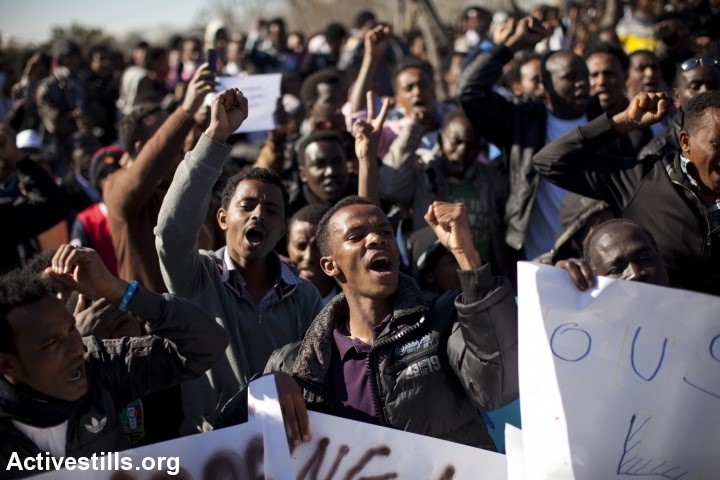Protests by African migrants and in Israel, unprecedented in their scope, continued for a fourth straight day Wednesday as about 10,000 people, many of whom came by bus from Tel Aviv, gathered at the Rose Garden in Jerusalem across from the Knesset. “We are refugees; we need protection,” they chanted. Signs carried by the protesters proclaimed: “We need protection;” “We are not criminals, we are refugees,” and “We are not infiltrators, we are human beings.” Organizers said more than 100 buses transported the protesters from Tel Aviv to Jerusalem.

Thousands of African asylum seekers participate in a protest in front of the Israeli Knesset in Jerusalem on January 8, 2014 (Photo: Activestills)
Well-know author David Grossman told the protesters that “for me, the name ‘Israel,’ contains the idea of refugees, of people who escaped from a terrible destiny to find refuge and shelter.” “I want to ask the Israeli government to listen to our voices, to check our asylum requests, in a transparent way,” Dawit Domuz, an Eritrean migrant and protest leader, told Israel Radio. A speaker at the rally, later Wednesday, called the Israeli parliament “the injustice Knesset for its purported ill-treatment of the migrant.”
Knesset Speaker Yuli Edelstein bowed to pressure from within the Knesset and barred protest leaders from entering the building to attend a meeting with opposition MKs Dov Khenin (Hadash) and Michal Rozin (Meretz), who had invited organizers to discuss the issues at the Knesset. A statement from Edelstein’s office said he had decided to deny the protesters access “against the backdrop of the tension and general public atmosphere, as well the fear that granting the infiltrators access will cause provocations in the parliament.”
MK Khenin said Israel has to change its policy toward migrants. “The government insists on continuing to import thousands of foreign workers every year, but prohibits asylum seekers here from working,” he said. “The time has come to stop bringing foreign worker to Israel, to make these jobs open to asylum seekers whom even the Foreign Ministry admits are impossible to deport, and scatter around the country in a way that makes sense.” The representatives had planned to deliver a letter addressed to Prime Minister Benjamin Netanyahu for Khenin and Rozen to pass on, but after Edelstein’s decision, they sent it to the media.
“We, asylum-seekers, invite you and the Israeli government to enter into a direct and open dialogue with us,” the letter stated. “In the last days we’ve told the Israeli public and the international community in a clear voice about our distress, about our lives in fear of arrest and the places we escaped. In the last days we’ve shown you and the Israeli public that we are not criminals. We are a law abiding, orderly and democratic community of asylum-seekers…
“We demand that you respect our human rights as refugees. The State of Israel was one of the first to sign the Refugee Convention [treaty]. If the Israeli government does not intend to honor the convention, transfer the process of our asylum requests to the United Nations. “We hope to hear your response and see a sign of positive change in Israel’s policy in the treatment of asylum-seekers in the coming weeks.”
Racist former interior minister MK Eli Yishai (Shas), meanwhile, said that the government should take advantage of the migrants’ mass protests to round them up and deport them. “Put them on airplanes and send them packing to their countries or a third country,” he said.
At the Saharonim prison119 detainees took their hunger strike into a third day, insisting that they would not stop until the state agreed to review their applications for asylum-seeker status. On Tuesday, the number of hunger strikers was pegged at 130. Officials have taken punitive measures against the strikers, such as not allowing them to shop at the canteen or use mobile phones. Thousands of migrants launched a three-day work strike and started staging protests in Tel Aviv on Sunday, with 20,000 people showing up to a march that started in Levinsky Park and ended with a demonstration in Rabin Square. And on Monday, about 5,000 Sudanese and Eritrean migrants demonstrated outside the US Embassy in Tel Aviv, flooding the boardwalk outside the building, while others gathered at the British and French embassies. Throngs of asylum-seekers held aloft signs and Eritrean and US flags as they chanted “Freedom” and “No more prison.”
Related:
African asylum seekers: We will continue to struggle until demands are met
MK Khenin: Israeli government offer harsh words an incitement against African asylum seekers
Tens of thousands of African migrants protesting in central Tel Aviv
Asylum seekers and Israelis protest in Tel Aviv against government policy
Human rights and gay rights activists rallies in Tel Aviv
African migrants sent back to prison after protest in Jerusalem
Hundreds of African migrants flee detention center and walk to Jerusalem to protest
Anti-migration bill passes final vote in Knesset


